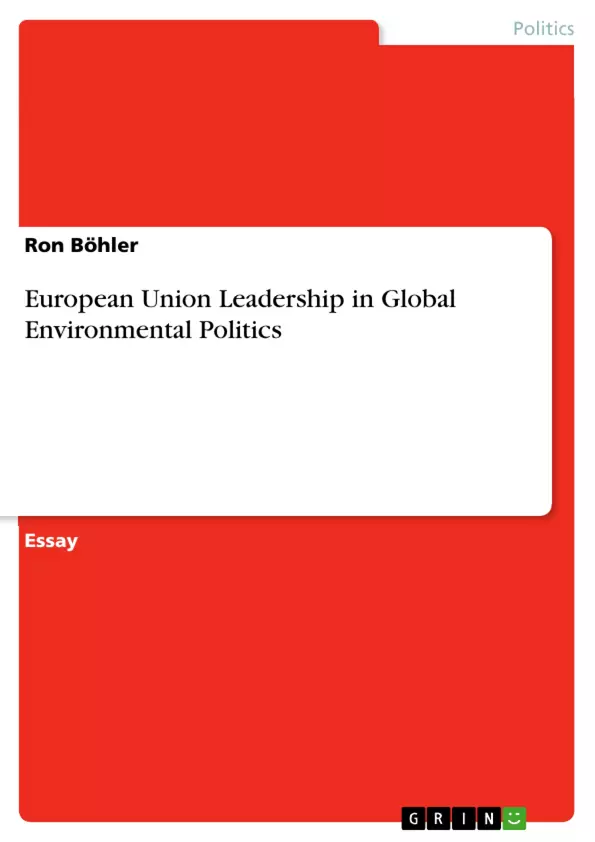Since climate change and related facets of environmental protection became increasingly global(ised) issues in the early 1970s, the international community attempts to address these questions collectively as well as substantially. Observers and commentators of international environmental negotiations thereby repeatedly hinted at the necessity of a strong leader in global environmental governance as a precondition to urge agreements on common approaches to climate change. Otherwise, the successful and sustainable mitigation of global warming and ecocides on a large scale might fail. The question is still highly controversial, why of all actors on the global scale the European Union (EU), which accounts for approximately 24% of hazardous greenhouse gases, shall be a leader in environmental politics and climate protection?
The main argument developed in this paper apprehends the European Union as a leader prima facie in international environmental politics. Whether the European Union fills a pivotal leading role according to, for instance, climate protection and sustainable development is a doubled feature. As will be argued below, the EU has undertaken massive efforts and strategic action to promote the reduction of greenhouse gas emissions (GHGE) and mobilised other members of the international climate regime to follow the European ‘leadership by example’ (Schunz 2011, pp.6-10). This dimension is clearly outward-looking and aims for behavioural change of other affected actors. Leading by example also calls for a certain degree of credibility to offer incentives to other players to pursue environmental goals. In respect of GHGE reduction, the European Union faces delays in implementing targets insistently and thus loses ground in international environmental governance to developing countries it is supposed to guide.
Inhaltsverzeichnis (Table of Contents)
- INTRODUCTION
- LEADING THE WORLD: CONCEPTS IN INTERNATIONAL CLIMATE POLITICS
- THE EU AND CLIMATE POLITICS: FROM ACTOR TO LEADER
Zielsetzung und Themenschwerpunkte (Objectives and Key Themes)
This paper examines the European Union's role as a leader in international environmental politics, particularly in the context of climate change. It explores whether the EU's efforts to reduce greenhouse gas emissions (GHGE) and promote sustainable development constitute a true leading role or simply a facade.
- The EU's "actorness" in international environmental negotiations
- The concept of political leadership in the context of climate change
- The EU's virtual leadership in promoting GHGE reductions
- The EU's factual leadership in implementing inner-European environmental protection legislation
- The EU's credibility and incentives for other actors to follow its lead
Zusammenfassung der Kapitel (Chapter Summaries)
- INTRODUCTION: This chapter sets the stage for the paper by discussing the increasing globalization of environmental issues, the need for strong leadership in global environmental governance, and the challenges faced by the EU in fulfilling this role. It introduces the main argument that the EU is a leader in international environmental politics but explores whether this leadership is truly effective.
- LEADING THE WORLD: CONCEPTS IN INTERNATIONAL CLIMATE POLITICS: This chapter delves into the theoretical framework of the EU's role in international climate politics. It examines the concept of political leadership within the context of international negotiations and explores different types of leadership, including structural, entrepreneurial, and intellectual leadership. It emphasizes the importance of 'actorness' and the ability to influence other actors through both 'hard power' and 'soft power' mechanisms.
- THE EU AND CLIMATE POLITICS: FROM ACTOR TO LEADER: This chapter analyzes the EU's role in international climate politics based on its status as an international actor. It explores various perspectives on the EU's role, including "aspiring leader," "effective international environmental actor," "green normative power," and "green giant." The chapter then establishes the EU's capacity for exercising power in global climate politics and lays the foundation for the subsequent discussion of leadership.
Schlüsselwörter (Keywords)
This paper focuses on the European Union's role in international environmental politics, particularly in the context of climate change. Key terms include: environmental politics, climate change, greenhouse gas emissions (GHGE), global environmental governance, leadership, actorness, structural leadership, entrepreneurial leadership, intellectual leadership, international negotiations, Kyoto Protocol, and sustainable development.
Frequently Asked Questions
Is the European Union a true leader in global climate politics?
The EU is considered a leader "prima facie" due to its strategic actions and "leadership by example," though its effectiveness is debated because of delays in meeting its own emission targets.
What are the different types of political leadership in climate governance?
The paper discusses structural leadership (based on power), entrepreneurial leadership (negotiation skills), and intellectual leadership (ideological influence).
What is meant by the EU's 'actorness'?
'Actorness' refers to the EU's capacity to function as a single, effective entity in international negotiations, despite being a collection of member states.
How much of global greenhouse gas emissions does the EU account for?
Historically, the European Union has accounted for approximately 24% of hazardous greenhouse gas emissions, which justifies its responsibility in leading environmental initiatives.
What challenges does the EU face in international environmental governance?
The EU faces a loss of credibility when it fails to implement internal targets quickly, potentially losing ground to developing nations it aims to guide.
- Arbeit zitieren
- Ron Böhler (Autor:in), 2011, European Union Leadership in Global Environmental Politics, München, GRIN Verlag, https://www.grin.com/document/376549



